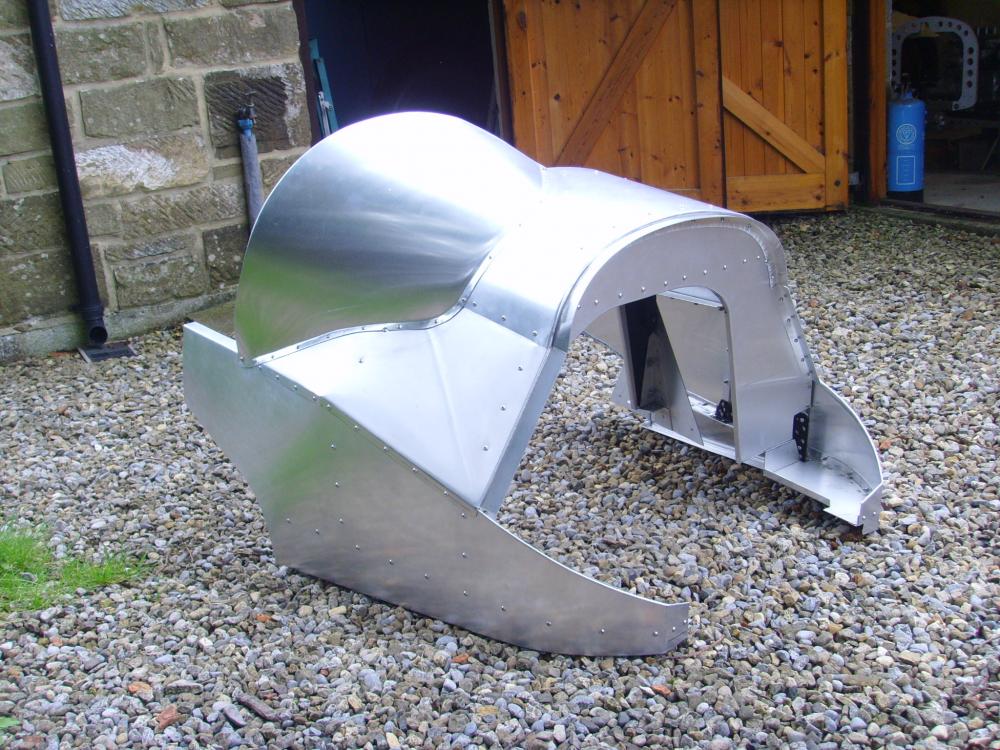07-09-2020, 03:42 AM
Thanks for the kind comments, Mark.
I have pondered over the rear suspension shock absorbers for some time. As you know, Mrs Jo-Jo had Hartford type friction shock absorbers attached to the extremities of the chassis outriggers, which were braced by a tube which possibly also acted as an anti-roll bar. My device has quite soft rear springs and I was worried that the bottom of the drivers seat might bottom over bumps. The ends of my outriggers are braced by a strong aluminium clad plywood bulkhead. The detachable tail section will attach to this bulkhead in due course. I decided that a pair of rubber bump stops would be a good idea to limit the rear spring deflection and it will also have webbing straps to limit any downward movement of the rear axle.
Mrs Jo-Jo spent much of her time at Brooklands which was notoriously bumpy even in the 1920's so she needed some good rear suspension and effective shock absorbers. My device will be used for track days and the odd sprint or hill-climb which will be on smooth surfaces (unless I go off piste!). Having attached some rubber bump stops at the back, I found that under the weight of the driver the suspension only has around 1" of movement before it is resting on them, after which the rubber stops are actually acting as the suspension medium in conjunction with the rear springs. Initially at least, I will run without any rear shock absorbers, relying on the leaf springs for damping. The rear axle is well restrained so will not be able to jump up and down to any extent. With only minimal rear suspension movement, I don't think any friction shock absorbers would do much at all?
If the suspension is something akin to an early Mini or a go kart I will be quite happy!
Photo of the main body tub which looks like something from the Russian space programme.
I have pondered over the rear suspension shock absorbers for some time. As you know, Mrs Jo-Jo had Hartford type friction shock absorbers attached to the extremities of the chassis outriggers, which were braced by a tube which possibly also acted as an anti-roll bar. My device has quite soft rear springs and I was worried that the bottom of the drivers seat might bottom over bumps. The ends of my outriggers are braced by a strong aluminium clad plywood bulkhead. The detachable tail section will attach to this bulkhead in due course. I decided that a pair of rubber bump stops would be a good idea to limit the rear spring deflection and it will also have webbing straps to limit any downward movement of the rear axle.
Mrs Jo-Jo spent much of her time at Brooklands which was notoriously bumpy even in the 1920's so she needed some good rear suspension and effective shock absorbers. My device will be used for track days and the odd sprint or hill-climb which will be on smooth surfaces (unless I go off piste!). Having attached some rubber bump stops at the back, I found that under the weight of the driver the suspension only has around 1" of movement before it is resting on them, after which the rubber stops are actually acting as the suspension medium in conjunction with the rear springs. Initially at least, I will run without any rear shock absorbers, relying on the leaf springs for damping. The rear axle is well restrained so will not be able to jump up and down to any extent. With only minimal rear suspension movement, I don't think any friction shock absorbers would do much at all?
If the suspension is something akin to an early Mini or a go kart I will be quite happy!
Photo of the main body tub which looks like something from the Russian space programme.




